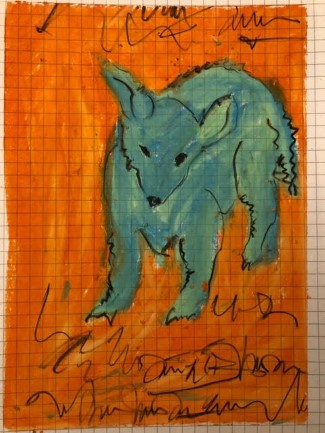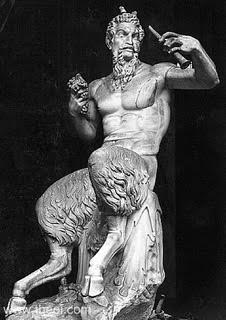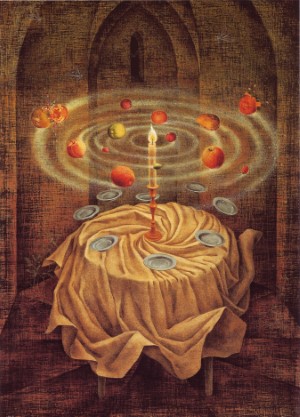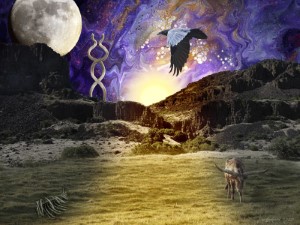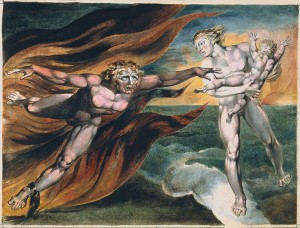What does it mean to live a creative life? Jung’s initiatory journey into the “spirit of the depths“ was creative but required profound psychic courage, suffering, and patience as he confronted the unconscious and discovered “the third thing.” Upon his “return,” when Jung wrote that “everything of which we are conscious is an image, and that image is psyche,” he elevated the imagination and creative processes. One of the gifts was his essay The Transcendent Function which conceptualized how unconscious and invisible psychic material became conscious and visible through play, dedication, endurance of wrestling with the opposites, and the respect for the ineffable and irrational aspects of the psyche. Jung thereby came to understand the importance of the “third thing.” Jung’s investigations into the unconscious through various creative means opened the door and gave credence for the expressive arts therapies. In this lecture the three-part initiation model provides a container in which we consider Jung’s wisdom and how the “third thing” may offer hints on living a creative life.
Season: Spring 2023
Creative Initiation Journey
Drawing from the three stages of a creative initiation journey – Gateway, Attending, Passage – we build a container, attend to the unconscious, and awaken the prospective psyche. The initiatory task of allowing for the “the third thing” or the “other” to present itself is a visual validation of the spontaneous psychic energy that gives meaning to lines, shapes, and colors. With our open-mind, curiosity, and determination, we will welcome the visual and expressive images as “strangers” and respect and honor the journey that unfolds.
Using art materials, writing, dreams, and/or active imagination, each person will attend to creative tasks to mark and document the imaginal path of individuation. Various prompts and tasks will be provided, while individuals who are more comfortable with materials can follow their own process within the creative initiation process.
*Artistic skill not necessary, only the willingness to be on the Fool’s journey.
**Supplies: please have a large journal, container of water, several different brushes, watercolor paper, acrylics or watercolors, basic oil crayons, tissue paper, tape, glue. Additional materials: maps, postcards, magazines, scissors, clay, crayons, pencils, pens, colored markers, inks.
Reclaiming the Wisdom of Ancient Myths
C.G. Jung’s revelation of the mythopoetic dimension of the human psyche, i.e., its story-making structure, gave credence to his hypothesis of the collective unconscious, its archetypal images and their healing intent. In this seminar, we explore the wisdom hidden in the ancient Greek myths of Myrrha and the great god Pan. Together, we will discover the meanings and guidance these age-old stories can offer us today.
In the myth of Myrrha, we examine the theme of incest as perpetrated by a daughter with her father. We find that a repugnant act such as this appears in biblical stories, as well, and ask why the usual form of incest — a father’s violation of his daughter — gets turned on its head in these tales. We see the archetypes of the collective unconscious, the gods and goddesses, having their way with us but don’t understand why we should suffer so. We learn what it means to violate the gods’ sacred principles. and, if we take the lesson to heart, are chastened by it. We explore the relevance of these ancient stories to modern life by looking at their reflections in the troubled lives of clients in psychotherapy and characters in film to recognize the many variations on the theme of incest.
With the myth of the great god Pan, we will look into this god’s creation, not only as a symbolic example of the expression of psyche’s unconscious drama and its inner processes, but also as a means by which the ancients, and now ourselves, make sense of the world. We explore the classical beginnings of this beloved pastoral god as religious myth, and then the ways secular motifs and energies of the myth live on in modern society. We look at Jung’s views of myth for the second half of life, and we will explore ideas about our own personal myths as a means of interpreting the past, looking at the present and finding guidance and inspiration for the future.
Dates and Times
- Sundays from 1:00 – 3:00 pm
Schedule
- February 12 – Diana Oxley
- February 26 – Diana Oxley
- March 5 – Diana Oxley
- March 26 – Carol Walnum
- April 2 – Carol Walnum
- April 9 – Carol Walnum
Cost
- 12 hours of instruction: $205 (OFJ members: $195)
- Sorry, we are unable to offer refunds.
- Continuing Education Credits are available, with one hour of CE credit for each hour of attendance. CEUs will be available for purchase
,at a cost of $15, which will cover all CEUs earned over the six-session seminar.
Reading
Reading assignments and material will be sent to participants in advance of the start of the seminar, and may be supplemented during the seminar.
Seminar Size
- Attendance is limited to 15 people
- If seminar fills, and you would like to be added to our wait-list, please write us at [email protected]. If you have any questions, please call 503-223-3080.
Seminar Leaders
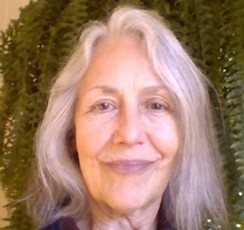 |
Diana Oxley, Ph.D., LPC, received her diploma in Jungian psychotherapy from the C.G. Jung Institute, Zurich, in 2019 and has been in practice since 2015. She maintains an office in Multnomah Village and is a member of the Pacific Northwest Society of Jungian Analysts. |
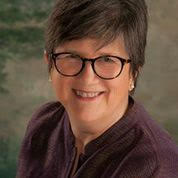 |
Carol Walnum, MA, MBA, LPC, is a practicing Jungian analyst and Licensed Professional Counselor in Oregon. She received her analytical training from the C.G. Jung Institute, Zurich. She is a member of the Pacific NW Society of Jungian Analysts and is currently its President. She is also President of the C.G. Jung Foundation Zurich, supporting training and education in analytical psychology globally. Carol Walnum has practiced as a Jungian analyst for nine years. She is fascinated with the development and impact of myth in various cultures and at points in history. |
The Coniunctio Gastronomique: God Becomes Flesh
Cooking, like alchemy, is the transformation of basic ingredients into refined substances. Psychologically, this alchemical process represents the development of the personality. Understanding the psyche through the art and practices of cooking can heal the mind-body split that is the primary wound of modern life. The food we purchase or grow, cook and eat, link us to the cosmos: then God becomes flesh, (in-carne). We become what we eat. The lecture invites us into the sensuous, alchemical temenos of the kitchen.
Sweating The Salmon
Our psyche is hungry for manifestation in the world, and through its appetites the soul makes itself known to us. The workshop delves into the symbolism of cooking and the personal and cultural myths of cooking and feasting. We amplify and work with archetypal dreams to reveal, through the ordinary and mundane imagery of the kitchen, its tools, methods and environment, possibilities for healing and glimpses of spiritual truth.
Ecopsychology and the Environmental Catastrophe
At the 2022 climate change meetings in Egypt, the UN Secretary General said, “We are in the fight of our lives, and we are losing.” Psychology has been embarrassingly slow to respond to the frightening deterioration of our planetary environment, but ecopsychology emerged in the 1990’s to address the issue. A case will be made that a Jungian version of ecopsychology offers the best framework for understanding the problems at the deepest levels and gives us a vision for the future. Hermes is the main god that will lead us into a better future or a continuation on a path to oblivion.
Jung, Hermes, the Tao and Complexity Theory
The Greek myth of Hermes stealing Apollo’s cattle explicates the dilemmas we humans face in relating to each other and to the environment. The secret is in the symbol of his wand: a figure 8 with a gap at the top. Hermes is about the transactions in the gap between opposites (the two upper arms on the 8). As such, Hermes is the god of ecopsychology because he is the god of businessmen, psychologists, diplomats, the advertising that sustains our consumer culture, and the human-environment relationship. Hermes’ association with the originating source, what happens between non-existence and existence—is symbolically associated with the Tao and with complexity theory—the mathematics of what happens between stability and chaos when change occurs.
Trauma, Innocence and the Core Complex of the Dissociating Psyche
Following early relational trauma, a dissociative system is set up in the psyche, composed of part-self personifications including an innocent/wounded child and his or her archetypal protectors. The main purpose of this Self Care System is to keep the innocent/injured child-self separated from the suffering of affective experience that might annihilate (or transform) it. Dreams during the psychotherapy process give us a picture of this core complex and its defensive “efforts” on behalf of the “child.” Working with these archaic energies in the transference can be a stormy affair. The Friday Talk will address and illustrate these archaic energies in the core complex that frequently stretch our understanding of the analytic situation in the direction of enactments and counter-enactments.
Trauma, Innocence and the Core Complex of the Dissociating Psyche
The Saturday workshop builds on the Friday lecture, deepens the work with the archaic energies in relational trauma, provides several clinical vignettes as illustrations, expands on the Self Care System, and invites conversation and engagement with attendees.
